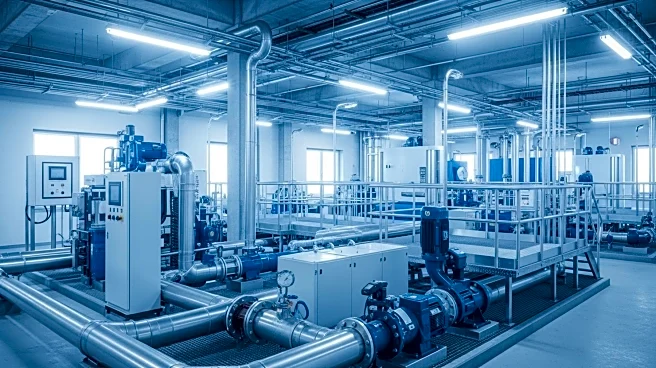What's Happening?
Burns & McDonnell, a Kansas City-based engineering firm, has been awarded an $80 million contract to construct a new water reclamation facility in San Marcos, Texas. The facility is designed to manage increasing wastewater demands due to planned residential developments in the area. The project will initially provide a capacity of 2 million gallons per day, with potential expansion to 8 million gallons. The construction will include two buildings with 20,000 square feet of administrative and processing space. The firm plans to implement a fast-tracked interim wastewater management system while designing the permanent facility, aiming to meet the accelerated timeline driven by regional growth. Construction is set to begin in January 2026, with completion expected by August 2028.
Why It's Important?
The development of the San Marcos water reclamation facility is crucial in addressing the growing demand for water infrastructure in Texas, a state facing significant water shortages. The Texas legislature has approved $20 billion to combat this looming crisis, highlighting the urgency of such projects. The facility will support residential growth and ensure sustainable water management, benefiting local communities and developers. This initiative reflects broader trends in infrastructure investment, as public builders seek opportunities in water management to address environmental challenges and support economic growth.
What's Next?
Construction of interim facilities is scheduled to begin in January 2026, with the permanent plant construction expected in the third quarter of the same year. The project aims for substantial completion by August 2028. As the demand for water infrastructure continues to rise, other contractors, like Zachry Construction, are also focusing on water projects, indicating a shift towards prioritizing sustainable water management solutions. The success of this project could influence future legislative and investment decisions in Texas and beyond.
Beyond the Headlines
The project underscores the importance of collaborative approaches in infrastructure development, as seen in the cost-sharing agreement with residential developers. This model could serve as a blueprint for future projects, promoting partnerships between public entities and private developers to address environmental and economic challenges. Additionally, the emphasis on fast-tracked solutions highlights the need for innovative approaches in tackling infrastructure demands, potentially setting new standards for efficiency and sustainability in the sector.








